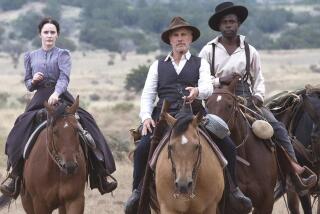Book review: ‘Sal Mineo: A Biography’ by Michael Gregg Michaud
- Share via
Sal Mineo
A Biography
Michael Gregg Michaud
Harmony: 410 pp., $25.99
Near the climax of “Rebel Without a Cause,” three angst-filled adolescents played by James Dean, Natalie Wood and Sal Mineo take refuge in an abandoned mansion. As Dean reclines on an old couch, Mineo innocently rests his head on the other boy’s arm, a display of male affection unseen before on screen. Mineo’s emotionally charged performance as John “Plato” Crawford would be recognized years later as the movies’ first gay teen, a prototype of the openly gay youths on Fox’s “Glee” and other shows today. The groundbreaking role made Mineo a legend, but his legacy has been obscured by rumors surrounding his career, his openness about his sexuality and his murder at age 37 in a botched mugging.
Michael Gregg Michaud’s “Sal Mineo: A Biography” is the first thorough profile of the Bronx-born son of a Sicilian casket maker, who was mentored on Broadway by Yul Brynner, twice nominated for an Oscar for supporting actor and who incited teen fans to “Mineo mania.” Writing in matter-of-fact, workman-like style, Michaud delivers a credible if sometimes detached account of the actor’s life.
Much of Mineo’s narrative is already well known: the street-smart beginnings, the natural acting chops, the teen-idol phase, the delinquent typecasting. Michaud further details the actor’s fall-off in the 1960s, much of it traced to questionable business decisions by his mother-manager. And with not-always-pretty details provided by male and female ex-lovers and a handful of fellow travelers, including the late Dennis Hopper and Janet Leigh, the book follows the self-destructive behavior that coincided with Mineo’s descent into low-budget stalker films.
By the 1970s Mineo was openly gay, sexually liberated and working in small plays and TV one-offs. He was stabbed to death outside his West Hollywood apartment in February 1976 after returning from a rehearsal. Rumors (hate crime, jilted lover, homophobic cops sabotaging the case) have lingered but the story, retold here without fanfare, shows that the assailant didn’t even know who Mineo was. That Mineo died in relative obscurity doesn’t negate the lasting influence of his work in “Rebel Without a Cause.” Mineo’s “searing and sympathetic portrayal of Plato,” Michaud writes, “burned a hole in the movie screen and in the hearts of millions of teenage girls and boys.”
Ryfle is writing a book about Hollywood during the civil rights era.
More to Read
Sign up for our Book Club newsletter
Get the latest news, events and more from the Los Angeles Times Book Club, and help us get L.A. reading and talking.
You may occasionally receive promotional content from the Los Angeles Times.






